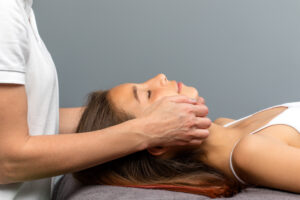Written by Patrick Jones, DPT, CCTT
Article
The temporomandibular joint or TMJ acts like a sliding hinge, connecting your jawbone to your skull. Dysfunction in this area can lead to pain and discomfort. Jaw pain, difficulty chewing, and clicking or locking of the jaw joint, and ringing in the ears are just some of the symptoms. This dysfunction can cause a range of problems from poor posture, chronic jaw clenching, and poor teeth alignment, to fracture or conditions such as lockjaw. There are some things that you can do from home on a daily basis to help alleviate jaw pain. Here are 5 simple tips for you to follow:
 1. Posture – One of the biggest contributors to jaw pain is how we sit or stand at work and at home. Throughout COVID many people transitioned to telecommuting or a hybrid schedule and have remained that way even 3 years post the Pandemic lock down. Working on a computer has caused people to slouch, round their shoulders, and have their head slide forward. All the things Mom and Dad yelled at us while we were growing up! They truly had the right idea as poor posture can cause more pressure to the TMJ and jaw increasing pain with talking and eating. Sitting up properly, placing your computer monitor or laptop in the proper position vastly reduces the pressure on the jaw and helps reduce pain by the end of the day. Take a look at the video below where I demonstrate the proper positions for working from home or the office.
1. Posture – One of the biggest contributors to jaw pain is how we sit or stand at work and at home. Throughout COVID many people transitioned to telecommuting or a hybrid schedule and have remained that way even 3 years post the Pandemic lock down. Working on a computer has caused people to slouch, round their shoulders, and have their head slide forward. All the things Mom and Dad yelled at us while we were growing up! They truly had the right idea as poor posture can cause more pressure to the TMJ and jaw increasing pain with talking and eating. Sitting up properly, placing your computer monitor or laptop in the proper position vastly reduces the pressure on the jaw and helps reduce pain by the end of the day. Take a look at the video below where I demonstrate the proper positions for working from home or the office.
 2. Eating – Frequently patients complain about popping or jaw pain with eating certain foods. One of the modifications I recommend for my patients is to reduce the difficulty of chewing in their diet. While it can be hard to change what we eat, applying what is called a blended or soft food diet reduces the activation of our chewing muscles. This allows the jaw and surrounding musculature to relax and heal before slowly reintroducing tougher foods like steak or fresh veggies. Some food items to avoid when having jaw pain are: nuts, chips, gum, thick meat like steak, fresh veggies, and candy.
2. Eating – Frequently patients complain about popping or jaw pain with eating certain foods. One of the modifications I recommend for my patients is to reduce the difficulty of chewing in their diet. While it can be hard to change what we eat, applying what is called a blended or soft food diet reduces the activation of our chewing muscles. This allows the jaw and surrounding musculature to relax and heal before slowly reintroducing tougher foods like steak or fresh veggies. Some food items to avoid when having jaw pain are: nuts, chips, gum, thick meat like steak, fresh veggies, and candy.
 3. Stress/Anxiety – This is another trigger for jaw pain that has really increased since the pandemic. It is common for people to hold their stress in their upper shoulders and neck which is closely related to the jaw and its health. When people have high stress levels they contract the muscles in the neck and jaw. This causes pain, headaches, and even increased jaw popping/cracking. Several ways to reduce stress are breathing/meditation, self care including massages or alone time, and using heat to relax the muscles.
3. Stress/Anxiety – This is another trigger for jaw pain that has really increased since the pandemic. It is common for people to hold their stress in their upper shoulders and neck which is closely related to the jaw and its health. When people have high stress levels they contract the muscles in the neck and jaw. This causes pain, headaches, and even increased jaw popping/cracking. Several ways to reduce stress are breathing/meditation, self care including massages or alone time, and using heat to relax the muscles.
 4. Sleep – Many people are unaware that how they sleep and what they use to sleep can contribute to their jaw pain. The best position to sleep is laying on your back to avoid putting direct pressure on either side of the face and causing stress to the TMJ. However, if you are a side sleeper there are several ways to decrease the pain in your jaw. Reducing how many pillows you sleep with is a big one. Having only one good pillow or two very narrow pillows under your head to keep the spine in a neutral position can vastly improve pain throughout the night or in the morning when you wake up. Another is to avoid putting your arm or hand under your head when sleeping as this can increase the pressure directly onto the TMJ.
4. Sleep – Many people are unaware that how they sleep and what they use to sleep can contribute to their jaw pain. The best position to sleep is laying on your back to avoid putting direct pressure on either side of the face and causing stress to the TMJ. However, if you are a side sleeper there are several ways to decrease the pain in your jaw. Reducing how many pillows you sleep with is a big one. Having only one good pillow or two very narrow pillows under your head to keep the spine in a neutral position can vastly improve pain throughout the night or in the morning when you wake up. Another is to avoid putting your arm or hand under your head when sleeping as this can increase the pressure directly onto the TMJ.

5. Physical Therapy – The best tool for helping your jaw pain or popping is PT!!!! The TMJ is a very friendly joint for Physical Therapy. Just like any sore muscles or joint in the rest of the body, PT can help reduce swelling, improve mobility, and stabilize the joint with the proper exercises. Your physical therapist can prescribe stretches, recommend proper postural and ergonomic changes for work or home, and use hands-on techniques to reduce any muscle knots or pain in the jaw. When consulting a Physical Therapist ask the clinic if they work with TMJ patients.
Hartz PT offers TMJ services for patients and is actively working with many people throughout Lancaster and the surrounding areas. If you have questions or would like more information please call Patrick Jones, DPT at 717.735.8880.
